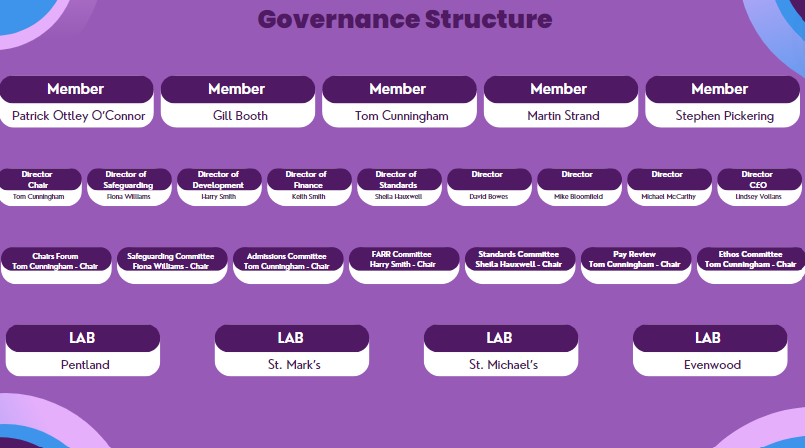- Home
- Governance and Policy
- Governance Structure
Governance Structure
We are very proud of our governance structure and believe it is a strong feature of the Trust and our schools

There are very clear Terms of Reference and a Scheme of Delegation for these groups which ensures strong accountability. All meetings are clerked by a member of the Trust Governance team. Natasha White supports all governance personnel.
If you would like any more information or are interested in becoming a governor, please contact Natasha.
Role of Members
Members are similar to a company’s shareholders, they sit above the Board of Directors and have a largely hands-off role. Their key responsibilities include appointing the Directors and holding them to account for the successful governance of the Trust. Through reports at the Annual General Meeting, supplemented by other reporting arrangements considered necessary, the Members will receive information to enable them to assess the effectiveness of the Board in its governance and leadership of the Trust.
Role of the Board of Directors
The Board of Directors requires a range of skills. Board meetings can cover a wide variety of topics ranging from the Trust’s business strategy; pupil achievement and attainment; quality of teaching and learning; buildings and financial investment; staffing and resources; partnership working. Directors must ensure the effective and efficient use of resources and will consider performance indicators and financial information on all aspects of the Trust’s activities.
The Trust has a scheme of delegation that sets out both responsibility and accountability and how together the CEO, Board of Directors, Local Advisory Board Governors and school leaders work together to achieve the ambitions for each school in the Trust.
The Boards ultimate accountability is to the pupils, parents and the wider community and Directors have a duty to fulfil the highest standards of corporate governance at all times. In performing these duties Directors are expected to follow a Code of Conduct which has regard to the accepted standards of behaviour in public life including; leadership, selflessness, objectivity, openness, integrity, honesty and accountability.
The Board of Directors are accountable for the three core functions of governance as defined by the Department for Education:
- Ensuring clarity of vision, ethos and strategic direction
- Holding the leadership of the Trust and the schools to account for the educational performance of the schools and their pupils
- Overseeing the financial performance of the Trust and making sure money is well spent.
Role of the CEO
Our CEO is responsible for the operation of the Trust including the performance of its schools. The CEO is the accounting officer and so has overall responsibility for the operation of the Trust’s financial responsibilities and must ensure the organisation is run with financial effectiveness and stability.
Role of the Local Advisory Boards
Beneath the Directors is an Advisory Board for each school. Each Advisory Board is responsible for carrying out some school-level governance functions for the Trust, build an understanding of each schools performance through scrutiny and evaluation of the quality of education and quality of care, engaging with stakeholders and maintaining the community ethos and culture of their school.
Role of Headteachers / Heads of School
Heads are responsible for the day to day management of the school and are accountable to the CEO. They must report to the Local Advisory Board on matters within its remit.

